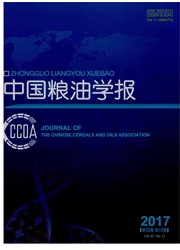

 中文摘要:
中文摘要:
本试验旨在探讨花生多肽对正常小鼠生长发育及免疫功能的影响。通过动物试验,测定小鼠体重、脏器及免疫器官质量、迟发性超敏反应、自然杀伤细胞(NK cell)活性、血清免疫球蛋白(IgG)含量等理化指标及免疫器官的形态学变化。结果表明,花生多肽能够增加小鼠的体重、脏器质量和脏器指数、免疫器官质量和指数,促进小鼠生长发育。中[200 mg/(kg.d)]、高剂量组[400 mg/(kg.d)]花生多肽能够调节迟发型超敏反应、增强NK细胞活性及血清IgG的含量,显著提高机体的免疫功能。小鼠免疫器官病理切片观察结果表明:中、高剂量花生多肽组小鼠脾脏组织淋巴小结生发中心扩张,增加了网状细胞和浆细胞数目,这提示花生多肽有提高机体免疫的作用。
 英文摘要:
英文摘要:
This study aims to explore the effect of peanut peptides(PPs) on growth and immune function of mice through animal experiment and observation of the trend of body weight and immune organs.Results:PPs accelerates the growth and development of mice to a certain extent.PPs at middle dosage[200 mg/(kg·d)]or high dosage[400 mg/(kg·d)]have obvious action on promoting the reaction ability of delayed type hypersensitivity(DTH),and raising the level of Natural Killer cell(NK cell) activity and content of serum IgG in mice.PPs improve the nonspecific and specific immune ability of mice.From pathological observation of spleen,the number of reticulocyte and plasma cell of spleen in mice fed with PPs at middle or high dosage are increased.These imply PPs could improve the immune function of mice.
 同期刊论文项目
同期刊论文项目
 同项目期刊论文
同项目期刊论文
 期刊信息
期刊信息
